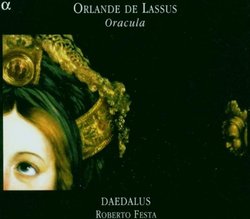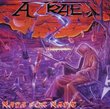| All Artists: O. Lassus Title: Orlande de Lassus: Oracula Members Wishing: 0 Total Copies: 0 Label: ALPHA PRODUCTIONS Release Date: 9/27/2007 Genre: Classical Style: Number of Discs: 1 SwapaCD Credits: 1 UPC: 3760014190957 |
Search - O. Lassus :: Orlande de Lassus: Oracula
CD DetailsSimilar CDs
|
CD ReviewsSomber Passion ... Giordano Bruno | Wherever I am, I am. | 05/06/2010 (5 out of 5 stars) "... and spiritual anguish are what you can expect to hear in this performance. The jolly Roland who could compose faster than his choristers could sing, who wrote drinking songs and slightly scurrilous madrigals in four languages, experienced something of a religious crisis in his later years. Religion, as we all know, seems to be the most potent stimulus of great music, whatever other ills it brings upon humanity. Certainly this was true for Orlande de Lassus (1532-1594); his madrigals were extraordinarily elegant and polished, but his sacred music elevated him to the rank of the greatest composer of his era.
This CD presents two large-scale settings of 'prophetic' texts, the first being a set of nine 'texts' from the Biblical book of Job (Lectiones Sacrae Novem ex libris Hiob) and the second being the better-known "Prophetiae Sibyllarum", using a text originally in Greek but tarnslated and published bi-lingually in Greek and latin in 1555. Lassus employed the Latin text, in which the twelve Sibylls are 'credited' with prophesies of the Coming of the Messiah. The two musical cycles complement each other; both are intensely chromatic declamations in a style that largely eschews polyphony in favor of stressing the syllabic rhythms of the words. One could hear this style as intensely conservation, a reassertion of the musical/liturgical values of plain chant elevated to emotional 'enthusiasm' by Lasso's bold chromaticism. Or one could hear these declamations as the expression of Lasso's own prophetic musical genius; they certainly sound very much like the fervent homophony of 17th and 18th C Huguenot composers. Should we send the doctoral candidates in musicology to the sources, to examine whether Lassus had crypto-Protestant sympathies? In any case, this music is distinctive, radically different in both its 'means' and its 'ends' from the works of de Rore, Palestrina, Gesualdo or any other composer whose career overlapped lasso's in time. The performance by Ensemble Daedalus is a revelation of Lasso's affective profundity. Daedalus, for this recording, is a menage of eight, all skilled soloists in their own rights: sopranos Monika Mauch and Ulrike Hofbauer, altos Audrey Burgener and Pascal Bertin, tenors Josep Benet and Bernd Lambauer, baritone Josep Cabré, and director Roberto Festa. Some of those names may be familiar to fans of "Ensemble Organum". Unfortunately, the CD notes don't specify who sings what or when, but it sounds as if some of the singing is one-on-a-part. Recording the sound of human voices singing in chorus remains an unsolved challenge, of course, and I can't declare that this recording thoroughly overcomes it. But it's both a better recording and a better performance than my previous first choice among CDs of the Prophetiae Sibyllarum, by Cantus Cöln. The notes are atrociously pretentious and inchoate, paying more attention to the hermeneutics of the cover art than to the art of the singers. The good news, neverthelss, is that the full texts are included in Latin and in English translation.... not that texts are needed to interpret the passion of this music!" |



